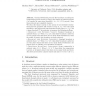111 search results - page 1 / 23 » Characterization of Secure Multiparty Computation Without Br... |
CRYPTO
2004
Springer
13 years 10 months ago
2004
Springer
Unconditionally secure multi-party computations in general, and broadcast in particular, are impossible if any third of the players can be actively corrupted and if no additional i...
WPES
2003
ACM
13 years 9 months ago
2003
ACM
Secure Multi-Party Computation enables parties with private data to collaboratively compute a global function of their private data, without revealing that data. The increase in s...
ASIACRYPT
2008
Springer
13 years 6 months ago
2008
Springer
Abstract. In secure computation among a set P of players one considers an adversary who can corrupt certain players. The three usually considered types of corruption are active, pa...
EUROCRYPT
2003
Springer
13 years 9 months ago
2003
Springer
Classical distributed protocols like broadcast or multi-party computation provide security as long as the number of malicious players f is bounded by some given threshold t, i.e., ...
JOC
2000
13 years 4 months ago
2000
The goal of secure multiparty computation is to transform a given protocol involving a trusted party into a protocol without need for the trusted party, by simulating the party am...

